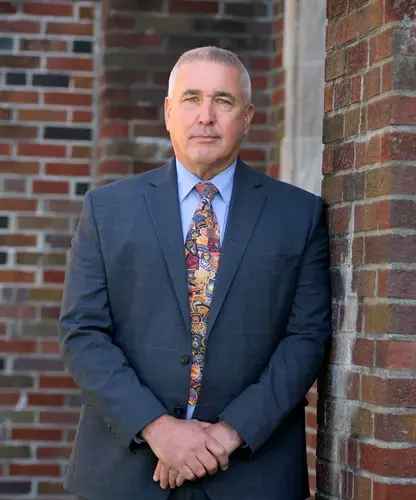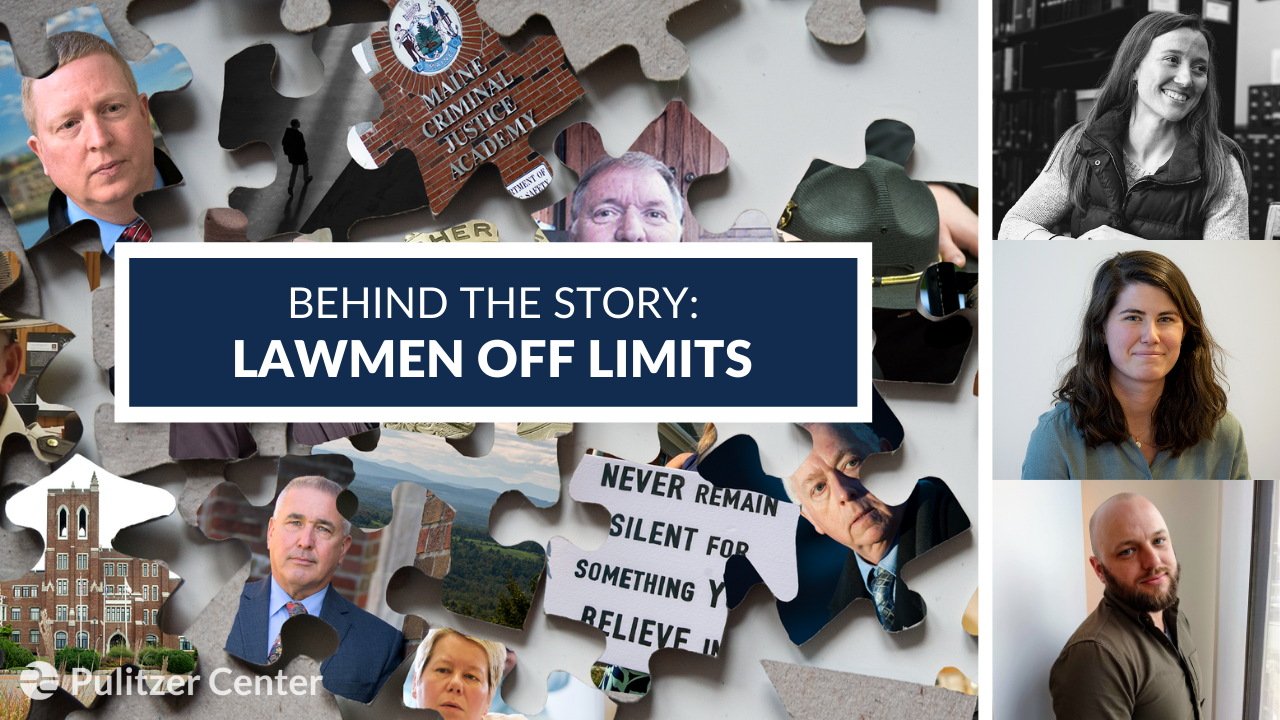
Editor’s note: This piece contains adult language. It is part of a series about how county law enforcement officers in Maine escape accountability. Read the other stories here. The series was supported by the Pulitzer Center.
On March 26, 2013, a father called police in Winslow to report that one of the newest police officers in the nearby town of Clinton had struck his teenage son in the face while off duty. When police interviewed the teen, an officer could see the skin beneath his eye was discolored, and his nose was cut.
The boy said Scott Francis hit him after he tried to “pull” Francis off his own teenage son, according to the police report. Francis’ son also told an officer that his father threw him against the kitchen cupboards.
Francis, 37 at the time, turned himself in when he learned police were looking to arrest him for domestic violence, and he pleaded not guilty to the charge. The Clinton Police Department still fired him.
It wasn’t the first time Francis had been ousted. The Washington County Sheriff’s Office had fired him three years earlier.
By 2013, a troubling portrait of the police officer also existed in civil court records — where a judge acknowledged Francis had abused his ex-wife and temporarily removed his son from Francis’ care — a history that was relevant to another agency that opened an investigation into Francis following his arrest: the Maine Criminal Justice Academy.
The academy’s board of trustees, a 17-member panel of mostly law enforcement officials, oversees the certification of all Maine police and corrections officers, who must obtain the credential to work in the state. If officers misbehave in specific ways, the board can revoke their certification, preventing them from getting another job in Maine law enforcement.
Francis’ assault case fell under the academy’s purview because it mainly penalizes officers accused of criminal behavior. Unlike a prosecutor, the academy needed to determine it was more likely than not that Francis had assaulted someone.
The broader implications of Francis’ treatment of others, such as whether he engaged in conduct unbecoming of a police officer, weren’t a basis for punishment by the academy because Maine law doesn’t allow it to decertify officers for cruelty or depravity.
In the fall of 2013, the local district attorney dropped the criminal case against Francis, saying it had insufficient evidence to prove the case beyond a reasonable doubt. Soon after, the academy followed suit.
Francis wasn’t suspended, reprimanded, required to pursue counseling or issued a letter of guidance, either, to name some of the other lesser measures the academy can impose on officers found in the wrong. For reasons that aren’t entirely clear because state law keeps unsubstantiated academy case records confidential, the academy determined there was not enough evidence to meet the threshold for any penalty against Francis. He kept his certification.
It marked the second time in three years that Francis avoided punishment from the academy. It wouldn’t be the last time he fell under its scrutiny.

‘We Have Had Enough’
Cases like Francis’ call into question whether Maine’s police overseer has enough authority to penalize officers for misconduct that betrays law enforcement’s code of ethics, to prevent them from getting future jobs in law enforcement.
Unlike in other states and professions, Maine law largely does not give the academy power to punish officers for misconduct that is not a potential criminal offense, even if their actions call into question their ability to fairly police the public. Human rights violations and ethical transgressions that damage the public’s faith in police — but are not crimes — do not rise to the academy’s purview.
Officers have kept their licenses despite repeatedly lying to their supervisors, belittling an inmate based on his intellectual disabilities and ethnicity, drunkenly mishandling a service weapon off duty, and sexually harassing their colleagues and prisoners.
It’s difficult to gauge misconduct that goes unreported. But discipline records kept by sheriff’s offices provide some clues. After reviewing hundreds of confirmed instances of misconduct at the county level over a five-year period, the Bangor Daily News identified 21 cases where there was enough information to conclude officials in another state likely would have had the authority to review the officers’ certification.
But in Maine, the behavior did not warrant action from the academy, or the sheriff’s office did not notify the academy because it knew the incident wouldn’t merit academy review. The academy relies on local agencies to report misconduct within 30 days.
The BDN specifically looked at examples of misconduct or incompetence involving county sheriff’s deputies and corrections officers, though similar themes and standards apply to state and municipal police officers and state prison guards.
Had the county officers with past misdeeds worked elsewhere, they might have faced tougher oversight. Florida officials hear cases on “misuse of official position,” sexual harassment and “discriminatory conduct” based on race, sex or other personal traits. South Dakota officers can lose their badge for engaging in “conduct unbecoming of a law enforcement officer.”
Likewise, other licensed professionals are held to higher standards of conduct than police and corrections officers. Doctors in Maine can lose their medical license for “unprofessional conduct.” The Maine Board of Overseers of the Bar can discipline lawyers for “conduct involving dishonesty, fraud, deceit or misrepresentation.” Unlike police officers, social workers are held accountable to the code of ethics they pledge.
“As a law enforcement leader, if I am not trusted, it can cause distrust in the important work my staff does every day,” said Lincoln County Sheriff Todd Brackett, currently Maine’s longest-serving sheriff.
“The issue is complex, as each sheriff’s office, police [department], county or municipality are independent employers and will have to consider the individual rights of the employee with any expanded authority that may be directed to the [academy]. In my opinion, the discussions should include other ethical and officer misconduct matters,” he said.
Had Francis been a patrolman in Missouri, he might not have escaped punishment in the immediate aftermath of his firings. Missouri officials can decertify law enforcement officers for acts that involve “moral turpitude or a reckless disregard for the safety of the public or any person.” Moral turpitude is defined as “an act of baseness, vileness or depravity” that is “contrary to justice, honesty, modesty and good morals.”
The provision is almost always used in conjunction with elements of a crime, but it allows Missouri officials greater flexibility to punish officers for misconduct without relying entirely on proving a crime itself, said Mike O’Connell, communications director for the Missouri Department of Public Safety.
“The benefit of the moral turpitude provision is that it provides another grounds for working to ensure that Missouri peace officers are acting in a manner consistent with public expectations of appropriate conduct,” O’Connell said.
He cited a recent example where a Missouri officer had his license revoked under this provision because he “engaged in unwanted, frightening contact” with a woman, prompting her to seek a protection order against him.
In an interview, Francis’ ex-wife described the years before and after her divorce as “a living hell.” The BDN does not name alleged victims of domestic violence.
In February 2010, she filed a protection from abuse order against Francis, alleging he physically abused her the previous summer. Though they were in the process of divorcing and no longer lived together, she continued to fear for her safety because “he was sneaking around my house at night,” she said.
In her court filing, she described the time Francis grew enraged during an argument in their bedroom in 2009 and allegedly punched a hole in the wall near where she’d been standing. He stomped on her foot with such force she thought he broke it. Afraid for her safety, she reached for his gun, and he tackled her to their bed, she wrote.
She enclosed pictures of bruises she developed the next day and where she’d spackled over the hole he created with his fist. There was also a written statement from her son’s teacher recounting that the boy had mentioned his father’s violence at school.
At the time, Francis was a newly hired Washington County Sheriff’s Office deputy. He had previously worked as an Indian Township game warden. She hadn’t reported the abuse to the police because she worried they would take Francis’ side. The officer who showed up to the house the night Francis allegedly punched a hole in the wall was a friend of his, she said.
“I trust cops now, but, in the position I was in then, I didn’t because I was always told, ‘It’s a cop family, and they’re going to back up the cop,’” she said.
The BDN was unable to reach Francis directly or through his former attorneys.
Six days after filing her protection order, Francis’ ex-wife withdrew it during a court hearing but doesn’t remember why because the period of time was so stressful.

“I hated going into the courtroom. I just hated it,” she said. She let a local domestic violence advocate take the lead instead. Withdrawing a protection from abuse order doesn’t mean victims recant their story, just that they decide not to move forward in court.
Sheriff Donnie Smith still fired Francis for “conduct unbecoming.” But, as would happen again in Clinton, the prosecutor in Washington County didn’t bring charges.
Because the district attorney declined to prosecute, the academy dropped the matter as well, according to a letter to Francis from Brian MacMaster, who served as chair of the academy’s board of trustees at the time.
(MacMaster, who is now head of investigations at the Maine attorney general’s office, said he couldn’t remember what happened, but, even if he could, it would be against the law for him to comment on Francis’ case.)
Smith recalled more details about Francis’ employment. “We had a sit-down talk with him, [saying], ‘You need to knock this off,’” said Smith, who left his sheriff’s post in 2014. Francis had only been with the sheriff’s office five months and denied the allegations of abuse. At the time, Smith thought, “Enough’s enough, before we were in over our heads.”
His feeling would prove prescient. In January 2012, a civil court judge modified the terms of the divorce agreement between Francis and his ex-wife after finding that Francis had been “about as openly hostile and disrespectful as any spouse I’ve seen on the bench in 19 years.”
Francis disrespected her in front of their children and intentionally undermined her relationship with their son, treatment she endured despite his having “abused her physically” in the past, the judge wrote.
A few months later, Francis began his brief tenure with the Clinton Police Department. His harassing behavior continued, his ex-wife said. After Francis was fired from his Clinton job, he appeared at her home unannounced in violation of their modified divorce agreement, she said, so a local sheriff’s deputy urged her to file another protection from abuse order. In the filing, she called him “unpredictable, unstable and very angry,” and restated that he had physically abused her in the past.
She and her daughter “have been living in fear and going through this for over 4 years,” she wrote, “and we have had enough.”

‘A Culture That Doesn’t Tolerate Officer Misbehavior’
The origins of how Maine oversees law enforcement officers can be traced to a span of minutes in the spring of 1992.
In Jackman, the remote Canadian border town, a woman opened fire with her shotgun on a group of fishermen who had sought refuge outside her secluded camp. At least one of the responding Somerset County deputies already knew Kathy Hagerty — that she was a certified Maine guide and “a crack shot.”
The situation didn’t end well, but it ended quickly. Hagerty refused the officers’ requests to come out of her house unarmed. Less than 10 minutes passed before they entered her home and, when she raised her rifle, shot her dead.
The fact that none of the officers were fired galvanized a woman named Linda Smithers, a self-described “pitbull” who lives about an hour-and-a-half south of where the shooting took place, on a 130-acre farm in the town of Starks. There had to be a better, more patient way for police to resolve confrontations, she believed, and more accountability for when they make mistakes.
Smithers funneled her frustration into a lobbying effort that ultimately bore the framework for what is now the complaint review committee of the Maine Criminal Justice Academy’s board of trustees, a subcommittee that reviews reports of misconduct by certified law enforcement officials.
The three-member panel requires a citizen member and recommends disciplinary outcomes to the full board, which takes a final vote. Smithers, who inspects and certifies organic farms for a living, served as chair of the complaint review committee from 1995 until 2010, when Lewiston defense lawyer Tom Peters took over. He chaired the committee until September.
Maine is among the majority of states that don’t require a criminal conviction to decertify officers. In other words, the academy can decertify officers for criminal conduct regardless of whether officers are ever charged. (Five states don’t require officers to be certified at all.)
But Maine differs from some other states by only giving officials a few ways to sanction officers for non-criminal activity: if an officer falls behind in mandatory yearly training, has sexual contact with the victim of a crime of abuse they are investigating, or if the officer misrepresents facts in the course of obtaining a certification.
The academy can also discipline officers who commit a “gross deviation” from a set of mandatory minimum standards for how police should do their jobs, such as how to approach a barricaded person — policies that, decades ago, Smithers envisioned could save the lives of people like Hagerty.

“In Maine, we have a culture that doesn’t tolerate officer misbehavior,” said Rick Desjardins, the director of the academy. There are occasional outliers, but “when an officer does misbehave, [other officers] are outraged, and when we take an action, we’re fully supported.”
Penalties typically depend on the circumstances. A felony conviction will guarantee an officer is decertified because they can no longer carry firearms. The academy exercises greater discretion in cases involving misdemeanor conduct, especially when the academy is convinced the officer shows remorse and can be rehabilitated, said Brian Pellerin, chairman of the academy’s board of trustees and an investigator for the U.S. Department of Health and Human Services.
Between 2008 and early 2019, the academy allowed eight county officers — seven corrections officers and one deputy — to keep their certification despite a criminal conviction. Six were for operating under the influence. The other two were for disorderly conduct. Often, the academy requires officers found in the wrong to address the reasons they got in trouble, such as by seeking help for alcohol use.
Over the same period, the academy sanctioned an additional eight county officers who never had a court case but whose behavior constituted criminal misconduct, showing how the academy has the authority to investigate officers like Francis even after district attorneys decline to prosecute them. The academy punished them because it verified their misconduct using a lower burden of proof than a prosecutor needs.
For example, the academy revoked the former Sabattus police chief’s certificate in 2019 after his ex-wife won a civil — not criminal — case against him for abusing her.
The ability to sanction officers regardless of whether they’re prosecuted in court gives the academy “tremendous power,” said Pellerin, the academy board chairman. But that power has limits. The academy has no authority over broader ethical transgressions, such as those that violate the Maine Human Rights Act.
So when a guard in Knox County mocked a part-Native American inmate with disabilities in 2014, he was fired, but he didn’t lose his license.
The guard, Andre Charette, called the man “living proof that an Indian fucked a buffalo,” “a load your mother should have swallowed,” and said “the best part of you ran down your mother’s leg,” in front of other inmates in the jail’s recreation yard.
He insulted the man as “a retard” or “a fucking retard” at least twice, including once while the inmate was playing basketball while the guard watched, “laughing and making fun of him,” according to testimony from another guard during a union arbitration hearing when Charette apealed his firing. The name-calling clearly upset the inmate, who said “something to the effect of, ‘This is officer discrimination,’” the other officer recalled.
The union arbitrator, who upheld Charette’s firing, agreed, calling his conduct “egregiously racist and discriminatory.” The guard also made “outright lies” by initially denying some of his comments. “Such conduct undermines the core function of a corrections officer,” he added.
At least he lost his job, said Joseph Jackson, president of the Maine Prisoner Advocacy Coalition. “I’ve heard officers use the N-word and not be fired,” said Jackson, who believes discrimination should jeopardize an officer’s ability to be certified. “There should be some moral standards that at least hold some consequences.”
Florida recently added discrimination as a reason to decertify officers, following a high-profile 2015 incident where Fort Lauderdale officers created a movie trailer-style video involving a racist depiction of former President Barack Obama and exchanged other racist texts, said Stacy Lehman, who manages the staff that prepare cases for Florida’s certification commission. The state has yet to bring a case under the new provision.
Rep. Jeffrey Evangelos, I-Friendship, is one of several Maine lawmakers planning to bring bills concerning criminal justice and police oversight before the Maine Legislature.
“I think the academy needs to review the list of offenses that they have under their jurisdiction and have a discussion of widely expanding them to include any and all inappropriate and illegal conduct that the rest of us would lose our jobs over,” said Evangelos, who serves on the legislative Committee on Judiciary.
Officials often tout the culture of Maine’s small, tight-knit law enforcement community as a backstop against troubled officers keeping their jobs when they’ve erred or from getting a new job after being fired. But there are risks to relying on local oversight, where punishment is often inconsistent, as Jackson observed.
It appears Francis slipped through the cracks. After he was arrested and fired from the Clinton police department in 2013, his former sheriff, Smith, received a telephone call.
“I got a call [from the Clinton town manager] sometime after they hired and fired [Francis], wanting to know if I had recommended him,” Smith said. “And I said I had not recommended him.”
But Smith hadn’t said not to hire Francis either, recalled Craig Johnson, the police chief in Clinton at the time.
“[Smith] indicated that it was an issue with a girlfriend or wife or something with Scott, and it was a bad reflection on the department, but he felt that Scott was a good officer, and just maybe if he got into law enforcement in another area it wouldn’t be an issue for him,” Johnson said.
What’s more, he felt better hiring Francis because the academy had dismissed its case against Francis in 2010, Johnson told the Kennebec Journal.
Francis’ arrest and firing wasn’t the only trouble he got into in Clinton.
In 2014, a Clinton couple sued Francis in U.S. District Court for illegally arresting and assaulting one of them about two weeks before Francis was fired. Francis denied the allegations. The parties reached a confidential settlement agreement in September 2016, and the case was dismissed.

‘Sworn to Uphold the Law’
Generally, the academy drops cases only when it cannot determine that the allegations are more likely than not to be true, said Peters, the former chair of the complaint committee. It has to follow due process laws and build a case that can withstand a challenge in Superior Court should the officer appeal its decision.
That said, when the complaint committee investigates a case, it often relies on criminal justice agencies with more staff and investigative resources, such as police departments and district attorneys’ offices, to compile evidence.
“Their investigations are a valuable tool to the [complaint review committee]. We presume there is no vast conspiracy to hide the truth and the investigations generally shed considerable light on the truth of what happened,” Peters said.
From there, depending on the case, the committee may decide to conduct interviews on its own, he said.
Ultimately, “if one of the sides is lacking, and I can’t establish [wrongdoing], for whatever reason, I am dismissing the case, just like a court [would],” Peters said, adding that, in some cases, “it doesn’t mean I like it.”
Because the academy only makes the final outcome of a case public — but keeps the evidence it reviewed confidential — it is difficult for the public to assess from the outside how the academy decided to dismiss a case, as with Francis’.
“If you have not interviewed the officer and the [assistant district attorney] involved and not reviewed the court records and investigative records, then you cannot have a full picture of why anyone took any action or non-action in this case or any case,” Peters said.
Francis’ ex-wife doesn’t recall ever speaking to someone from the district attorney’s office when she filed her protection order in 2010. She only recalls explaining what happened to a pair of officers from the sheriff’s office, where Francis worked.
“I don’t know how the academy does their thing,” she said. She just wished someone would have “looked at the big picture.”
Smithers, Peters’ predecessor on the complaint review committee, is proud of the system she helped create, including the due process protections that may have, at times, left her feeling frustrated.
“It took me a long time to realize I couldn’t wave my magic wand and make bad guys go away. It’s a fair process. It’s not 100 percent right, and people slip through,” she said.
“The board has made great strides from where it was in 1992 to today. Though maybe it’s time to add more things, like moral turpitude,” to its authority, she went on. She suggested lawmakers could look at misbehavior “on the rise” as a next step.
“From a distance, sexual harassment is getting a bit much. But there’s no law now that the academy can deal with it,” she said. “The only way to address these behaviors [and] actions is to legislate a change in the law. That is how the [complaint review committee] came into being.”
It is probably best for states to have “a hybrid approach” to officer decertification where they can revoke certifications for both specific misconduct and more general wrongdoing, wrote Roger Goldman, an emeritus law professor with St. Louis University and an expert in police licensing.
“If it is good enough for doctors, it is good enough for police officers,” he wrote in a 2013 paper.
Pellerin, chairman of the academy’s board of trustees, said he would be open to discussing the idea with lawmakers. While the majority of Maine law enforcement officers are upstanding people, “there are some mistakes you just can’t be in law enforcement for,” he said. During a board meeting in September, he suggested adding more members to the three-member complaint review committee to spread out the amount of work.
In the end, Francis faced consequences for actions that had nothing to do with domestic abuse.
In early 2016, Francis was convicted on multiple counts of theft, perjury and tax evasion. He was found guilty of receiving more than $16,000 in workers’ compensation benefits from the town of Clinton for an injury he said he received on the job that prevented him from working. However, he still drew income from elver fishing and avoided paying income taxes. He also lied about his work history under oath.
Two months later, in April, the academy revoked his certification. Francis hadn’t been a cop for three years. It marked six years from the first time he had come onto the academy’s radar.
As Francis awaited his jail sentence, his lawyer pushed for less jail time than the prosecutor’s suggestion of nearly a year, arguing that Francis had taken responsibility for his actions and had no previous criminal record.
The state saw it differently, especially in light of his dishonesty. “He, more than other people, understood the importance of the oath that he took,” the state’s attorney wrote. “As a graduate of the Maine Criminal Justice Academy, he knew that he not only was sworn to uphold the law but also to testify truthfully.”
A judge sentenced him to 120 days in county jail.

Education Resource
Behind the Story: Lawmen Off Limits
The Bangor Daily News exposed the holes in oversight of Maine county law enforcement: how no one can...





